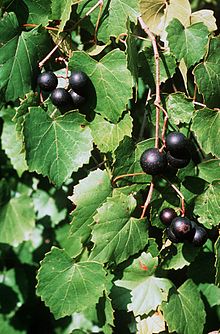Muscadine grapes
| Muscadine | |
|---|---|
 |
|
| Scientific classification | |
| Kingdom: | Plantae |
| (unranked): | Angiosperms |
| (unranked): | Eudicots |
| (unranked): | Rosids |
| Order: | Vitales |
| Family: | Vitaceae |
| Genus: | Vitis |
| Subgenus: | Muscadinia |
| Species: | V. rotundifolia |
| Binomial name | |
|
Vitis rotundifolia Michx. |
|
Vitis rotundifolia, or muscadine, is a grapevine species native to the southeastern and south-central United States from Florida to Delaware, west to eastern Texas and Oklahoma. It has been extensively cultivated since the 16th century. The plants are well adapted to their native warm and humid climate; they need fewer chilling hours than better known varieties and they thrive on summer heat.
Muscadine berries range from bronze to dark purple to black in color when ripe. However, many wild varieties stay green through maturity. Muscadines have skin sufficiently thick and tough that eating the raw fruit is not popular among consumers. Muscadines are typically used in making artisan wines, juice, and jelly. They are rich sources of polyphenols.
In a natural setting, muscadines are important plants for improving wildlife habitat by providing cover, browse, and fruit for a wide variety of animals.
Although in the same genus Vitis with the other grapevine species, muscadines belong to a separate subgenus, Muscadinia (the other grapevine species belong to subgenus Euvitis), and some have suggested giving it standing as a genus of its own. Some taxonomists have also suggested splitting two additional species off from Vitis rotundifolia, Vitis munsoniana and Vitis popenoei. All have 40 chromosomes, rather than 38, are generally not cross-compatible with Euvitis species, and most hybrids between the subgenera are sterile. A few, however, are at least moderately fertile, and have been used in breeding. A commercially available Euvitis x Muscadinia hybrid is the Southern Home cultivar.
There are over 300 muscadine cultivars grown in the Southern states. These include bronze, black and red varieties and consist of common grapes and patented grapes.
Unlike most cultivated grapevines, many muscadine cultivars are pistillate, requiring a pollenizer to set fruit. A few, however, such as 'Carlos' and 'Noble', are perfect-flowered, produce fruit with their own pollen, and may also pollinate pistillate cultivars.
...
Wikipedia
